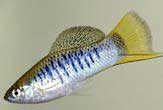 |
|
Image: Livescience |
You might think that fish are expert swimmers from the moment they hatch. However, this is not the case. When they are born, fish larvae struggle to move and survive. Approximately 99% of fish die during this larval stage.
It is only as they grow that they learn to evade predators more effectively. Adult fish can quickly escape thanks to their ability to dart upwards and dive downwards—skills that allow them to reach high speeds and then glide away. Many species do not possess this skill at birth.
Scientists have long suspected that the extremely light weight of these young larvae prevents them from achieving the necessary momentum during the darting phase. Additionally, their small size may make the water feel syrupy, hindering their movement.
However, a recent study on zebrafish larvae concluded that their underdeveloped fins and ineffective swim bladders hold them back. These fish simply cannot maintain a stable horizontal position in the water.
This finding may also apply to other fish species, the research team stated.
“The momentum can explain the poor swimming performance in some fish larvae species, but not all, and the differences in diving ability cannot simply be explained by variations in their body length,” said Ulrike Muller, the lead researcher from Wageningen University in the Netherlands. “Many fish larvae hatch with underdeveloped pectoral fins, and all of them are born without swim bladders, so similar issues in seahorses may occur with them as well.”
T. An
















































